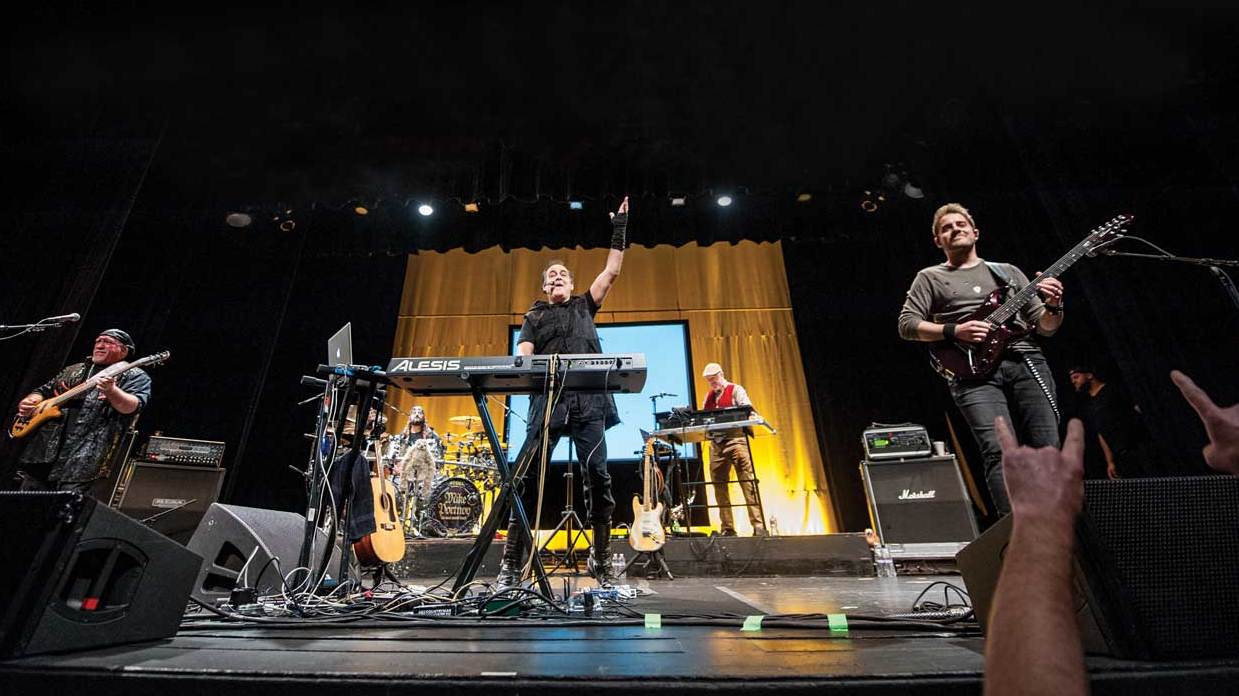Located 30 kilometres south-east of downtown Los Angeles, Whittier – whose local secondary school served as Back To The Future’s Hill Valley High – is best known as the childhood home of disgraced former president Richard Nixon. On a day when millions around the world marched to protest the inauguration of America’s new commander-in-chief, it’s therefore a serendipitous setting for the fourth stop of the Neal Morse Band’s Road Called Home tour, in which the quintet perform their ambitious and sprawling new concept album The Similitude Of A Dream in full.
Of course, the only topic that’s even more divisive than politics is religion, which – fair or unfair – seems to be a major reason why the post-Spock’s Beard body of work by the group’s namesake singer/keyboardist doesn’t receive more attention.
Tonight, however, both disciples and non‑believers who’ve managed to separate the medium from the message are rewarded with a riveting two-and-a-half-hour set by five world-class players, including a star turn by budding guitar hero Eric Gillette. As for Morse himself, he displays far more energy than any 56-year-old rightfully should, in an immersive and immensely likeable performance. From the sold-out show’s opening notes, when he takes to the stage alone, wearing a hooded cloak while illuminating his face with a flashlight, Morse’s passion is contagious; his smiles, infectious; his musical dexterity, staggering. Clearly, he’s having a ball.
The complete play-through of The Similitude… brings back memories of Dream Theater’s Metropolis 2000 tour, when the band peppered performances of Scenes From A Memory with modest video projections illustrating the album’s storyline. Tonight’s show features a similar production, with a large screen between the respective drum and keyboard risers of Mike Portnoy and Bill Hubauer.
At centre stage, Morse has a keyboard rig of his own, but while he delivers his fair share of impressive one-handed solos throughout the show, he spends nearly as much time playing a 12-string acoustic or a Stratocaster – sometimes in the course of the same song. (During Makes No Sense, he somehow makes it seem effortless to change guitars while simultaneously singing.)
There’s also a strong Dream Theater vibe on some of the album’s music, as its more orchestral moments (Overture, Breath Of Angels) recall Six Degrees Of Inner Turbulence, while The Mask has a similar vibe to the sci‑fi progressive metal of Systematic Chaos. The Ways Of A Fool, meanwhile, is a charming cross between Spock’s Beard, Transatlantic and soda shop doo-wop. Elsewhere, guitar riffs nod to Kansas (So Far Gone), Deep Purple (The Man In The Iron Cage) and The Who (I’m Running). It’s obvious that Morse and company are not only students of the game, but that they graduated with honours.
Although the journey concept of the album’s spiritual hero isn’t exactly light reading, Morse and his merry band supply levity on several occasions. In Sloth, a lyric is tweaked subtly to poke fun at Rip Van Portnoy: ‘Nothing makes Mike grin more than sleeping in.’ There’s also a stuffed sloth prominently displayed on his drum kit, and bassist Randy George attaches a second such animal to his instrument’s headstock during the song.
Later, Freedom Song feels like a bluegrass-prog hoedown, with Portnoy playing a tambourine and an acoustic kick-drum while Hubauer strums a mandolin. While on paper it sounds like a kitchen sink approach to songwriting, it’s a delight to watch live.
It should be noted that although Morse has released nine solo albums to date, The Similitude… is the second record by The Neal Morse Band. The distinction might seem subtle, but live, it becomes clear what an important contribution each member makes. It’s unfair to say that Hubauer and guitarist Eric Gillette simply supply backing vocals, as in addition to steady supplies of harmonies, both are given multiple spotlight moments on the mic.
Never shy to sing himself, Portnoy nonetheless seems more subdued than usual, with none of his typical spit-flying showmanship – although he does manage to sneak in a brief solo at the start of I’m Running. George, meanwhile, spends much of the show playing in a steady and unassuming manner, so when he delivers a knockout solo during the same song, the impact reverberates much more.
Still, Morse is unquestionably the group’s musical and spiritual nucleus. During the encore performance of Momentum, he leaves the stage and takes a lap around the theatre, offering a few hugs and high-fives along the way. Whether or not you share his beliefs, it’s impossible to resist cheering him on. Here’s hoping the wind continues to be at his back.
